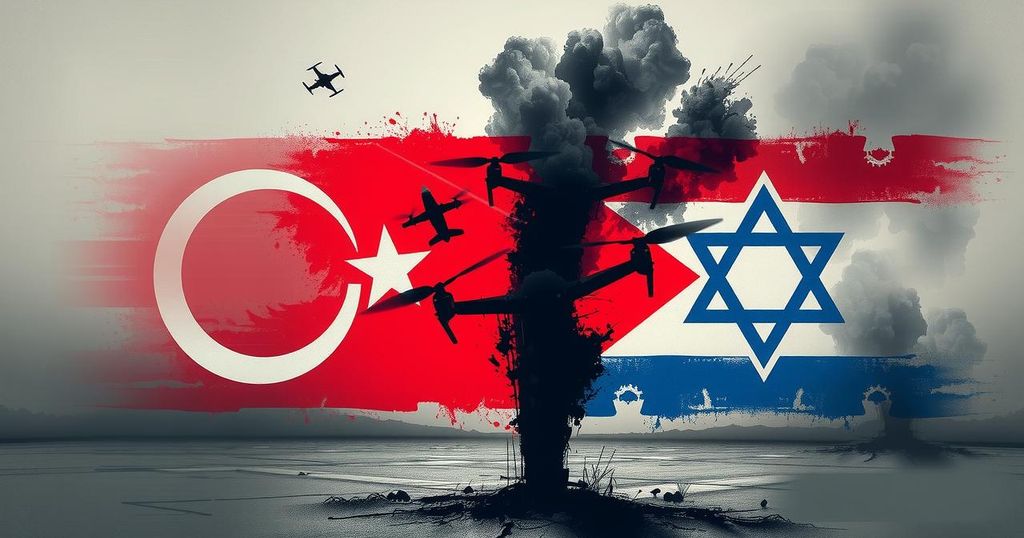Turkey’s Erdoğan Compares Netanyahu to Hitler, Intensifying Tensions with Israel
Turkey’s President Erdoğan drew sharp controversy by comparing Israel’s Netanyahu to Hitler amid Israel’s military actions against Iran. The comments provoke a fierce response from Israel, amplifying existing tensions between the two nations. As military conflicts escalate, the implications for U.S. interests in the region remain significant.
Tensions between Turkey and Israel escalated recently when Turkish President Recep Tayyip Erdoğan made controversial comments comparing Israeli Prime Minister Benjamin Netanyahu to Adolf Hitler. This statement comes in light of Israel’s military operations against Iran, further complicating the already strained relationship between the two NATO allies. Both Erdoğan and Netanyahu have been vocal regarding their perspectives, and the fallout continues to deepen.
Erdoğan, in a speech and a post on his social media account, stated, “Netanyahu has long surpassed the tyrant Hitler in the crime of genocide. We hope their fate will not be the same. Hopefully, sooner or later he will appear before an international independent court.” His remarks followed Israel’s strikes on Iranian positions aimed at curtailing perceived threats to its national security.
In response, Israeli Foreign Minister Gideon Sa’ar did not hold back, labeling Erdoğan’s comments as inflammatory. He characterized the Turkish leader as one with an agenda of oppression within his own country, claiming that Erdoğan lacks the moral authority to criticize others. Sa’ar stated, “The Sultan in his own eyes, in yet another inflammatory speech, continues to incite against Israel.” The use of comparisons to Hitler is particularly sensitive in Israel, given the historical context of the Holocaust.
The relationship between Turkey and Israel has always been a mix of cooperation and conflict. While both nations share economic and security interests, political confrontations have frequently created diplomatic rifts. Recent events have only added fuel to the fire, especially as both countries navigate a growing military confrontation in the region. Just recently, Israel executed further airstrikes against Iranian targets, leading to casualties on both sides and a broader regional crisis.
As tensions mount, the implications of this feud extend beyond Turkey and Israel. The United States, having strategic interests in both countries, finds itself in a precarious position. Interestingly, Prime Minister Netanyahu was described by Israel’s Defense Minister as “the modern Hitler” as part of ongoing rhetoric directed towards Iran’s leadership, indicating that the situation is becoming increasingly volatile and dangerous.
The statements from Turkey’s Foreign Ministry, which defend Erdoğan’s rhetoric, underscore a recurring theme—Israel’s government actions provoke strong reactions from Ankara. They assert, “The responsibility for Netanyahu’s name being mentioned alongside perpetrators of historic atrocities lies solely with himself, as he currently stands accused of crimes of genocide before international courts.” This exchange of accusations has just intensified the already complex relationship between the two nations.
As the conflict evolves, the potential for further complications looms larger. The deterioration of relations between Turkey and Israel could pose significant challenges for U.S. interests in the Middle East, stirring worries about an escalation of hostilities that might entrain broader regional conflicts. Diplomatic efforts may be urgently needed to de-escalate these tensions if a larger confrontation is to be avoided.
In short, Erdoğan’s recent comments comparing Netanyahu to Hitler highlight the deepening rift between Turkey and Israel. The ongoing military confrontations and political provocations are setting the stage for a potentially volatile situation, placing U.S. interests in jeopardy. As both nations navigate these heightened tensions, the need for diplomatic engagement becomes increasingly pressing to avoid further escalation.
Original Source: www.newsweek.com




Post Comment